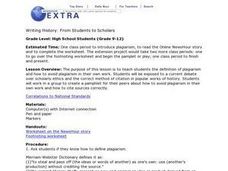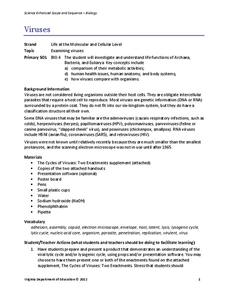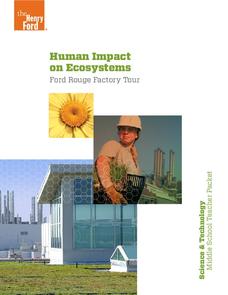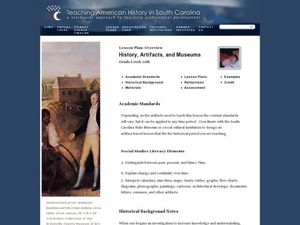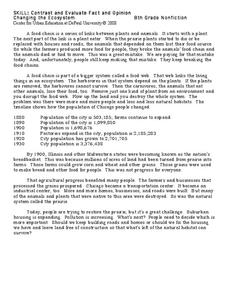Curated OER
Classification and Binomial Nomenclature
Young scholars practice identifying different groups of living organisms using a dichotomous key. Students also examine the history of an organism and its lineage by writing a paragraph about it and "three generations" of ancestors.
Curated OER
Writing History: From Students to Scholars
An Online NewsHour article about scholarly ethics launches this study of plagiarism. Since historians are supposed to bring original ideas and perspectives to their publications, they must give credit to the ideas of others. After a...
Virginia Department of Education
Viruses
Germs, parasites, and viruses, oh my! Facilitate a lesson on viruses as individuals explore functions of Archaea, Bacteria, and Eukarya. They learn how viruses compare with other organisms in nature and how they contribute to health...
Henry Ford Museum
Human Impact on Ecosystems
An environmenta science unit includes three lessons plus a cumulative project covering the ecosystem. Scholars follow the history of the Ford Rouge Factory from its construction on wetlands and how it destroyed the...
Curated OER
History, Artifacts, and Museums
Eleventh graders interpret historical evidence presented in primary and secondary resources. In this historical artifacts lesson, 11th graders select and research historical topics that require them to interpret calendars, timelines,...
Curated OER
Lesson 6: Natural Resources
Students create a travel poster about a favorite place in Florida. In this Florida activity, students research their favorite place and use desktop publishing to create a poster. They also make a brochure using Microsoft Publisher.
Curated OER
Natural History of Costa Rica
Students use outline maps to become acquainted with Costa Rica. They see how it was formed and how its origin has created very diverse environments. Students then use atlases and compare their physical maps with maps of climate and the...
Curated OER
Civilization in Ancient Mesopotamia
In this ancient Mesopotamia worksheet, learners respond to 29 short answer and fill in the blank questions about the ancient civilization.
Curated OER
A Short History of Natural Gas
In this energy source worksheet, 3rd graders read a short passage about the history of natural gas. Students must then answer several multiple choice questions about the passage.
Curated OER
Animal Life Histories Derived From Morphology
Learners learn the mechanisms of natural selection by deducing information from the physical appearance of the animal.
Curated OER
What We Can Learn From Oral History
Students read oral history accounts of the 1930s and 1940s from "The Greatest Generation" books. They discuss how the common good and civil society was strengthed by these men and what they did for America. They research another time...
Curated OER
Arkansas Festivals of the Land
Middle Schoolers research Arkansas community festivals which are tied to the landscape. They create brochures that reflect the festival from a geographical and historical perspective and share them with the class. This ambitious and...
Curated OER
Chocolate Chip Cookie Mining
To understand the impact coal mining has on the environment, pupils will extract chocolate chips from a cookie. Imagine the cookie is the environment and the chips are the coal. Instruct them to mine as many chips as they can, then have...
It's About Time
Polymers
All plastics contain polymers, but not all polymers are plastic. Young chemists make their own polymer and compare the properties to those of other states of matter. After a reading passage, pupils answer analysis questions about natural...
Macmillan Education
Webquest: Thanksgiving
Class members use the Internet to research the history of Thanksgiving in the United States and Canada, as well as the traditions surrounding the Thanksgiving-style celebrations of the Hebrews, the Chinese, and in Ancient Greece and Rome.
Indian Land Tenure Foundation
Sharing Resources: The Nuts Game
The land has always provided its inhabitants with resources that allow them to survive. However, sometimes resources run scarce and sharing becomes an important task. Help little ones understand why and how people have shared resources...
Wildwood Trust
Habitats
The circle of life is all around us, from the black bears in the nearby mountains to the pile of dead leaves in the backyard. Encourage young scientists to take a critical look at the world around them with a set of lessons...
Judicial Learning Center
American Equality Milestones
Has equality always existed as an unalienable right in the United States? Use this worksheet to chronicle the history and progression of equality in major documents and speeches throughout American history. The graphic organizer asks...
Urbana School District
Magnetism
The compass was first used in 206 B.C., but we didn't discover magnetic poles until 1263 A.D. Presentation begins with the history of magnetism before continuing on to magnetic fields, magnetic forces, electromagnets, currents,...
State Bar of Texas
Gibbons v. Ogden
Have you ever played the game Monopoly? Do you know what it takes to win the game correctly? Scholars research the nature of outlawing monopolies in the United States while controlling trade. They investigate the court case Gibbons v....
Indian Land Tenure Foundation
Native Foods and Livelihoods
Introduce young scholars to the ways in which land and people have a relationship. They examine the types of food local tribes have traditionally consumed and ways in which the people and the land both benefited from the act of...
Texas State Energy Conservation Office
Global Climate Change
Here is an extensive reading resource that addresses our climate change crisis. It thoroughly explains the greenhouse effect, related Earth cycles, and the history of climate change. Use it as part of the intended unit, published by the...
DePaul University
Contrast and Evaluate Fact and Opinion
How can you tell when an author is expression an opinion or stating a fact? Use two short reading selections to emphasize the difference between a statement that you can prove and one that you can't. The first passage explains food...
International Technology Education Association
Reinventing Time
Take a trip through time. A lesson resource provides instruction on the origin of current measurements for time. The text explains the different tools humans used throughout history to measure time as well as provides examples such as...
Other popular searches
- Museum of Natural History
- Australia Natural History
- Natural History Writers
- Natural History of Hawaii
- Natural History Museums
- Australian Natural History
- Natural History Yosemite
- Ancient Natural World



